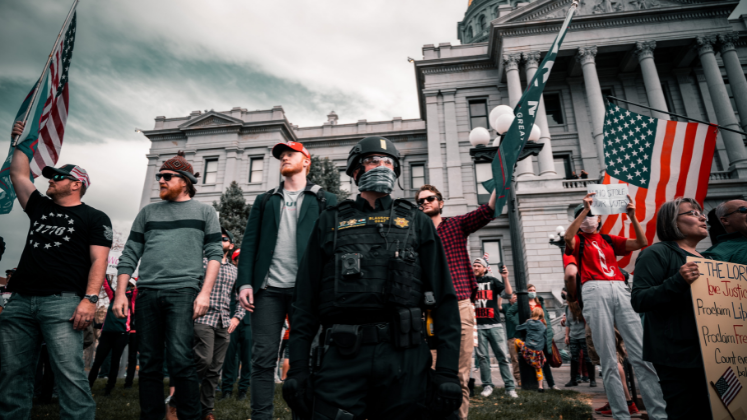Polarisation has been rising globally for decades. Whilst most prominent in the US two-party system or over issues such as Brexit, it is also found in Russia, Poland, Japan and many other countries. Defined as a divide between opposing political camps (such as leave and remain in the Brexit debate), polarisation is characterised by an “us versus them” attitude, especially in cases characterised by a binary option. Here, Annika Hecht, a Master’s student in Social and Cultural Psychology, discusses how polarisation emerges and what can be done to overcome it.
Political science differentiates between elite – very common in a parliamentary system – and mass polarisation, i.e. the polarisation of the general public or within a whole society. Whilst the difference between policy positions is termed ideological polarisation, we speak of affective polarisation when supporters of the other political side are seen in a very bad light and the opposing groups hold strong negative emotions towards each other. They may be very hostile towards the other group and feel overly affectionate towards their own side. The question now is, how does polarisation emerge, how is it reinforced and, most importantly, how can it be reduced?
The emergence of polarisation
Polarising issues have been around for as long as people have been able to hold opinions. There usually is more than one way to look at any topic, and if views consolidate around two opposing camps, we speak of a polarised issue. However, there are many factors influencing the emergence of polarisation.
Influence of the media
The media, especially social media networks, are often accused of enhancing polarisation due to so-called “filter bubbles” or “echo chambers”, i.e. algorithms filtering out opposing information to one’s own beliefs. However, even exposure to adverse views has been found to potentially increase polarisation. There have even been instances of political parties using social media to influence election outcomes, such as the Cambridge Analytica scandal in the 2016 US elections, which famously misused Facebook data for political advertising.
Influence of political elites
Political elites have also been known to promote polarisation among their electorate in order to gain or retain power, for example in Turkey. Some political campaigns rely on attacking the political opponent, reinforcing biased views and hostility and therefore increasing polarisation.
How to bridge the divide
Some good news first: political polarisation is not as bad a threat as the media like to claim. Most people on both ends of the ideological spectrum actually disagree less on policy than we think. However, this is not to say that polarisation is not an issue whatsoever, there are definitely big and growing divisions between opposing political groups in many areas.
Now, whilst it is often seen as a threat to democracy and social cohesion – and can absolutely lead to both of those – polarisation does not always have to be negative. Depending on the circumstances, being opposed to another political group may aid in breaking the status quo, and to fight against inequalities or power imbalances. Higher levels of polarisation have been linked to increased voter turnout, and affective polarisation in particular can be essential for protest behaviour.
However, given all the instances in which polarisation is not quite as helpful, research has looked into ways to reduce the tensions that are dividing the opposing camps. Providing people with impartial, objective information has the potential to reduce polarisation, but the effect is highly sensitive to contextual factors.
National elite discourse, i.e. the way in which well-known politicians and people in the public spotlight talk about issues, has been shown to be very influential in determining the degree of polarisation on particular issues. For example, one study found that when political elites in a country spoke in more positive terms about immigration, Europeans – on average – tended to be more open-minded as well. But when they used more negative terms, the general public showed more hostile attitudes towards immigrants, too. This means that politicians can have a significant impact in depolarising a society.
When it comes to the emotional component of polarisation (i.e. the strong dislike of the other side and affection towards one’s own side), research found that experiencing enthusiasm for just one person from the opposing party may lead to reduced hostility. This is because we think of this person as a prototype for the other group, and if this one individual does not seem so bad, we view the whole group less negatively by extension.
Reducing polarisation
Summing up, what can be done to reduce polarisation? First of all, we need to realise that we are not as different as we think we are. Social media could play a role here since it can, as well as increase polarisation, be used to depolarise too. Information about exaggerations of political differences can reach a vast number of people online. Simply being made aware of this bias, as well as being exposed to displays of inter-party gatherings and collaborations (which can also be spread online), have been shown to be effective in reducing polarisation.
In a top-down approach, politicians can be essential in depolarising endeavours as well, at least in democratic societies. By promoting democratic norms, using less exclusionary discourse and setting examples of inter-party collaborations, they can influence their electorate and reduce bias against other parties and their voters.
Finding a balance
However, we should not overlook the fact that a certain amount of disagreement is essential for a healthy democracy. Pluralism in itself is a good thing; problems only arise when divergent views lead to excessive animosity toward opposing political factions. In our current climate, where polarisation is frequently framed as the ultimate challenge of democracy, it’s crucial to remember that cognitive dissonance or ideological tensions are not inherently bad. Moreover, it’s important to understand that issues might not always be perceived as fair, and different individuals may have varying perspectives. We need to distinguish between a healthy degree of ideological polarisation, and heavily (affectively) polarised disputes. Therefore, efforts to mitigate polarisation may benefit from focusing on reducing animosity between groups, rather than necessarily striving to bring them ideologically closer.
Notes
- The opinions in this post are of the author, not of the Department of Psychological and Behavioural Science or LSE.
- All images licence-free from Canva.
References
- Armaly, M. T., & Enders, A. M. (2021). The role of affective orientations in promoting perceived polarization. Political Science Research and Methods, 9(3), 615–626. https://doi.org/10.1017/psrm.2020.24
- Bail, C. A., Argyle, L. P., Brown, T. W., Bumpus, J. P., Chen, H., Hunzaker, M. B. F., Lee, J., Mann, M., Merhout, F., & Volfovsky, A. (2018). Exposure to opposing views on social media can increase political polarization. Proceedings of the National Academy of Sciences, 115(37), 9216–9221. https://doi.org/10.1073/pnas.1804840115
- Casal Bértoa, F., & Rama, J. (2021). Polarization: What Do We Know and What Can We Do About It? Frontiers in Political Science, 3. https://www.frontiersin.org/articles/10.3389/fpos.2021.687695
- Druckman, J. N., Klar, S., Krupnikov, Y., Levendusky, M., & Ryan, J. B. (2022). (Mis)estimating Affective Polarization. The Journal of Politics, 84(2), 1106–1117. https://doi.org/10.1086/715603
- Eibach, R. (2021). Ideological Polarization and Social Psychology. In Oxford Research Encyclopedia of Psychology. https://doi.org/10.1093/acrefore/9780190236557.013.240
- Harteveld, E., & Wagner, M. (2023). Does affective polarisation increase turnout? Evidence from Germany, The Netherlands and Spain. West European Politics, 46(4), 732–759. https://doi.org/10.1080/01402382.2022.2087395
- Iyengar, S., Sood, G. & Lelkes, Y. (2012). Affect, not ideology: A social identity perspective on polarization. Public Opinion Quarterly,76 (3), 405–43.
- Kosinski, M., Stillwell, D., & Graepel, T. (2013). Private traits and attributes are predictable from digital records of human behavior. Proceedings of the National Academy of Sciences, 110(15), 5802–5805. https://doi.org/10.1073/pnas.1218772110
- McLaughlin, B., Holland, D., Thompson, B. A., & Koenig, A. (2020). Emotions and Affective Polarization: How Enthusiasm and Anxiety About Presidential Candidates Affect Interparty Attitudes. American Politics Research, 48(2), 308–316. https://doi.org/10.1177/1532673X19891423
- Ryan, A. (2023). Exploring differences in affective polarization between the Nordic countries. Scandinavian Political Studies, 46(1–2), 52–74. https://doi.org/10.1111/1467-9477.12244
- Schmidt-Catran, A. W., & Czymara, C. S. (2023). Political elite discourses polarize attitudes toward immigration along ideological lines. A comparative longitudinal analysis of Europe in the twenty-first century. Journal of Ethnic and Migration Studies, 49(1), 85–109. https://doi.org/10.1080/1369183X.2022.2132222
- Sidik, S. M. (2023). How to tackle political polarization—The researchers trying to bridge divides. Nature, 615(7950), 26–28. https://doi.org/10.1038/d41586-023-00573-5
- The Importance of Mitigating Polarization in Turkey. (n.d.). GMFUS. Retrieved 6 March 2023, from https://www.gmfus.org/news/importance-mitigating-polarization-turkey
- Vaidhyanathan, S. (2018). Anti-social media: how Facebook disconnects US and undermines/ democracy. (Ch 6, The Political machine). New York: Oxford University Press.





